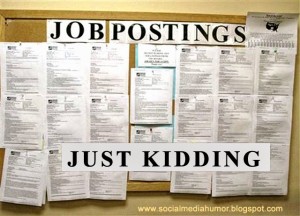— August 16, 2017

Tumisu / Pixabay
If you have been interviewed by a job recruiter that didn’t know anything about your job or a hiring manager that was new to interviewing, this post is for you.
After reading this post, you won’t have to worry about being cheated out of your job offer by a bad recruiter. Based on the stories I hear from my clients, crappy job recruiters come in all shapes and sizes. Below I list a few examples of what I have heard:
- My job recruiter didn’t know anything about the role, they were obviously not a tech recruiter.
- The job recruiter was obviously new to recruiting; they didn’t understand their role.
- When I was interviewed, the job recruiter came unprepared. They didn’t know anything about me and they admitted to printing off the resume on the way to the interview.
Hear me ROAR
Readers of HRNasty know that I preach one thing and one thing only!
Take control of your career! Don’t leave it in the hands of monkeys, or bad managers. Don’t let one asshole employee frustrate you and quit. Be pro active with your career. Corporate life is a game, WIN IT!
OK, so that is half a dozen rants, but you get the idea. Take control of your career biatches! (You don’t want to hang out with me today, I am on fire!)
Yes, we absolutely can take control of our careers. Type a career topic of choice into the search field on the left hand pane and prior posts will prove you can “Win the game of Corporate Life”. How do you take control of the job interview? Read on my young Jedi.
What does it take to land a job offer?
There are a number of factors that stand between the candidate and a job offer. I explain to the folks I work with I can get them into the top 2-3 candidates and then after that, it takes a little bit of luck. But get into the top 2-3 a couple of times and you will learn how to create luck. To land a job, it takes:
- Qualifications / experience (resume qualifications should match the job description)
- Presentation layer (this can include your cover letter, resume and how you dress)
- Your preparation for the job interviews (research on the company and hiring manager)
- Practice, Practice, Practice (Did you practice your interview answers out loud or just think about in your mind and wing it)
If you did all the above with the dedication of an athlete training for first place (there is no second place when it comes to landing a job) there is one thing that can still stand in your way.
If you are interviewed by a job recruiter who knows nothing about your job, or a manager who is inexperienced with interviewing, you are set up to be screwed.
Large companies have formal training plans for interviewing and recruiting. In larger companies you won’t be allowed to interview unless you have been through the company interview training. Smaller to medium-sized companies do not have the resources for proper training. Which leaves the candidate at a definite dis advantage.
Below is an examples of how an inexperienced, untrained hiring manager can scrap your candidacy for the job offer.
Inexperienced Interviewer
Interviewer:
“I notice on your resume that you went to XYZ University. What was your GPA?”
Candidate:
“3.0 in my marketing concentration”
Interviewer doesn’t say this, but is thinking: “That isn’t such a tough school, a 3.0 isn’t very good and that is in his concentration. The overall GPA is probably only a 2.75. This candidate won’t be able to hack our training program. Lets get this interview over with, this candidates is done.”
Interviewer that is having a bad day just gets lazy
Interviewer:
“I notice on your resume that you went to XYZ University. What was your GPA?”
Candidate:
“3.0 in my marketing concentration”
Interviewer:
“What was your overall GPA?
Candidate:
“2.75 GPA”
Interviewer:
“Did you work during school?”
Candidate:
“Yes, I worked during school. I worked in the school cafeteria washing dishes.”
Interviewer doesn’t say this but is thinking:
“That isn’t such a tough school, a 3.0 isn’t very good and that is in his concentration. The overall GPA is probably only a 2.75. This candidate won’t be able to hack our training program. Lets get this interview over with, this candidate is done.”
The candidate doesn’t realize that working a specific number of hours can be important to the question. To the candidate, this question is unrelated to the GPA question and doesn’t recognize the need to explain they worked 25 hours a week.
A trained job interviewer
Interviewer:
“I notice on your resume that you went to XYZ University. What was your GPA?”
Candidate:
“3.0 in my marketing concentration, 2.75 overall”
Interviewer:
“Just out of curiosity, did you work or play sports during school?”
Candidate:
“Yes, as a matter of fact I did. I am proud of myself because I am the first person in my family to go to school and I put myself through. I worked 25 hours a week during the school year and worked two jobs during the summer. During the summer I worked about 50 hours a week.”
Interviewer:
“Wow, you took on a heavy load. What kind of jobs did you hold during school?”
Candidate:
During the school year I worked in a warehouse moving boxes for a large retail company. It was tough work, but the pay was good for an hourly job and helped me pay for school. During the summer, I worked the same job and that is why I worked 50 hours. I could work over time and it really helped me save money.
Interviewer:
“That seems like a lot. How did you manage to go to school full-time and work all those hours?”
Candidate:
“I played varsity basketball and we practiced a lot. I maintained a high GPA in high school. In college, to relieve stress I joined an intramural league that had games on Saturday mornings. I really looked forward to these games to relieve stress. It was only a 3-hour commitment a week so it was pretty manageable.”
MoneyBall
The third interviewer took the time to dig and to find out the story behind the answer. In digging, found out that this was a candidate with a great work ethic. Yes the GPA was only a 3.0, but this while working through school and coming from a family where education may not have been a priority or an option. I would much rather have this candidate over the candidate who earned a 4.0 GPA, didn’t hold a job because mommy and daddy paid the entire 4 years of tuition and studying came easy.
The great interviewer will take the time to dig. This interviewer will be able to present candidates that other companies are passing on. Think about the movie MoneyBall with Brad Pitt. These guys found players that other teams passed on. Personally, I pride myself on finding candidates that needed uncovering. I pride myself on finding candidates where the hiring manager is thinking “What is HRNasty seeing that I am not seeing? I don’t want to interview this guy.” If they are thinking this then other hiring managers probably passed on them as well and we can uncover a hidden gem. This candidate will be loyal to us for giving them a break where other companies did not.
It’s not intentional
The interviewer that doesn’t dig for additional information probably does not know to dig or how to dig. If they haven’t been trained, they don’t know what they don’t know. If an interviewer talks with a candidate and hears about a 3.0 GPA, they will come to me and say “I want to decline this candidate, they only have a 3.0 GPA.”. I of course try to defend the candidate and explain the work ethic, earning their way through school, and the physical labor. Unfortunately, at this point, the interviewer has made up their mind and we lost momentum. They have been thinking about declining this candidate and it will be tough to change their mind. The train has left the station.
The way we overcome this is by being pro-active and take control of our career. Assume that there will be no follow-up questions and assume that every question is the equivalent of a “What is your weakness?” questions. Make it easy for the interviewer to understand you are qualified and make it easy for the interviewer to defend your candidacy.
Make the job interviewers life easy
Give the answer that the job recruiter isn’t going to dig for
“I earned a 3.0 GPA in school and I am really proud of this. During school worked 20 hours a week moving heavy boxes in school and closer to 50 hours a week during the summer so I could earn over time pay. Within my family, I am the first child of 3 to go to school. I wasn’t discouraged from going to school, but my family couldn’t afford to support me. If I wanted to go to school I would have to pay for it myself. My first couple of quarters in school were tough and my GPA was pretty low. But I figured out how to study. By my senior year, I was earning close to a 3.8. My overall GPA was a 3.0 and it is something I am proud of.”
In this answer, we owned our potential weakness. We didn’t bash spoiled rich kids who didn’t have to work, and we talked about our work ethic. We tell enough of a story that the listener is going to want to hear more.
Don’t let an inexperienced job recruiter or a recruiter who doesn’t know about your job get in between you and the opportunity. Take control of your destiny and give the interviewer something they can share with the hiring manager.
Next week, part two of this series where we give a few more examples of taking control of the job interview and the job recruiter.
Corporate Life is a game, Win It!
Business & Finance Articles on Business 2 Community
(77)
Report Post






